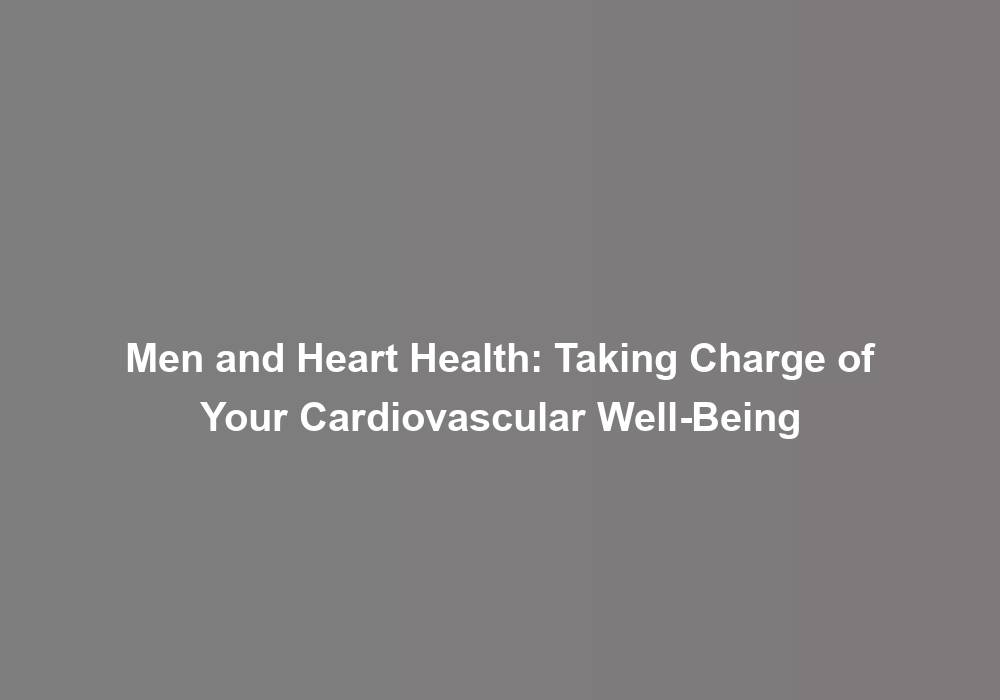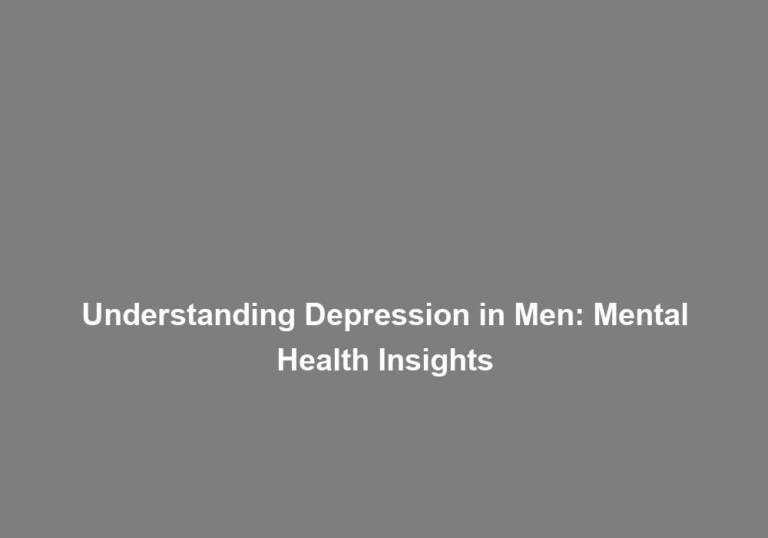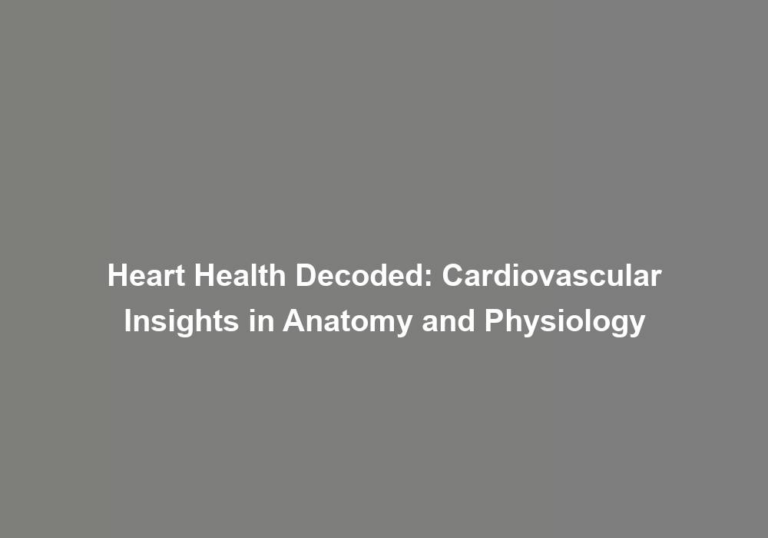Men and Heart Health: Taking Charge of Your Cardiovascular Well-Being
Taking care of your cardiovascular health is a crucial aspect of maintaining overall well-being. You may not realize it, but heart disease is a significant risk for men. Understanding how to manage this risk is essential for leading a healthy and active life. By making a few simple lifestyle changes, you can take charge of your heart health and reduce the likelihood of developing cardiovascular issues. But where do you start? Well, letG??s explore some effective strategies that can help you prioritize your cardiovascular well-being and ensure a healthier future.
Understanding Heart Disease Risk
Understanding your risk of heart disease is crucial for making informed decisions about your health and well-being. As a man, there are specific risk factors that can contribute to heart disease. Factors such as high blood pressure, high cholesterol, smoking, diabetes, obesity, poor diet, physical inactivity, excessive alcohol consumption, and stress can significantly increase your risk. ItG??s essential to be aware of these risk factors and to take proactive steps to mitigate them.
To lower your risk of heart disease, itG??s important to adopt prevention strategies that can make a real difference in your cardiovascular health. Start by scheduling regular check-ups with your healthcare provider to monitor your blood pressure, cholesterol levels, and overall heart health. Making lifestyle changes, such as quitting smoking, eating a heart-healthy diet, engaging in regular physical activity, and managing stress, can significantly lower your risk. Additionally, maintaining a healthy weight and limiting alcohol intake are crucial steps in preventing heart disease.
Importance of Regular Exercise
As you focus on reducing your risk of heart disease, regular exercise plays a pivotal role in improving your cardiovascular health and overall well-being. Engaging in physical activity brings a multitude of benefits that directly impact your heart health. Here are some exercise benefits to consider:
- Enhanced blood circulation: Regular exercise promotes better blood flow, allowing your heart to work more efficiently and reducing the risk of blood clots and plaque buildup in your arteries.
- Strengthened heart muscles: By engaging in activities like brisk walking, swimming, or cycling, you can strengthen your heart muscles, improving its ability to pump blood effectively throughout your body.
- Lowered blood pressure: Physical activity can help regulate your blood pressure, reducing strain on your heart and decreasing the risk of developing hypertension.
Incorporating exercise into your daily routine doesnG??t have to be daunting. Simple physical activity suggestions can make a significant difference in your heart health. Consider activities like taking the stairs instead of the elevator, going for a brisk walk during your lunch break, or joining a recreational sports team. These small changes can add up to substantial improvements in your cardiovascular well-being. Remember, you have the power to take charge of your heart health through regular exercise, and your heart will thank you for it.
Healthy Eating Habits for Heart Health
To maintain a healthy heart, adopting nutritious eating habits is essential. Portion control and balanced meals play a crucial role in promoting heart health. When it comes to portion control, itG??s important to be mindful of how much youG??re consuming. Overeating puts unnecessary strain on your heart and can lead to weight gain, which is a risk factor for heart disease. Aim to fill half your plate with fruits and vegetables, one-quarter with lean protein such as fish or poultry, and one-quarter with whole grains. This simple guideline can help you maintain balanced meals and keep portion sizes in check.
In addition to portion control, focusing on nutrient-rich, whole foods is vital for heart health. Nutrient-rich foods provide essential vitamins and minerals that support overall cardiovascular well-being. Opt for whole foods such as fruits, vegetables, whole grains, lean proteins, and healthy fats like avocados and nuts. These foods are packed with nutrients and are lower in unhealthy fats, cholesterol, and sodium, all of which can contribute to heart disease if consumed excessively. By choosing nutrient-rich, whole foods, youG??ll be nourishing your body with the essential nutrients it needs to function optimally.
Managing Stress and Mental Well-Being
Feeling stressed or overwhelmed? ItG??s important to remember that managing stress is crucial for your heart health. In the next section, weG??ll cover practical techniques for stress management and ways to support your mental well-being.
Stress Management Techniques
Managing stress and maintaining mental well-being are essential for overall heart health. To help you manage stress effectively, consider incorporating the following techniques into your daily routine:
-
Deep Breathing Exercises: Take a few minutes each day to practice deep breathing. Inhale deeply through your nose, hold your breath for a few seconds, and then exhale slowly through your mouth. This can help calm your mind and reduce stress levels.
-
Progressive Muscle Relaxation: Practice tensing and then relaxing each muscle group in your body, starting from your toes and working your way up to your head. This technique can help release physical tension and promote a sense of relaxation.
-
Mindfulness Meditation: Set aside time for mindfulness meditation to focus on the present moment and cultivate a sense of inner peace. This practice can help you manage stress and improve overall mental well-being.
Mental Health Support
Incorporating mental health support techniques into your daily routine is essential for managing stress and promoting overall well-being. Therapy options and counseling services are valuable resources for addressing the mental aspects of heart health. Engaging in therapy sessions can provide you with effective coping strategies, stress management techniques, and a safe space to process your emotions. Additionally, counseling services offer personalized support to help you navigate the challenges that may impact your mental well-being. Seeking professional help does not indicate weakness, but rather demonstrates your commitment to taking charge of your cardiovascular and mental health. Remember, managing stress and prioritizing your mental well-being are crucial components of your overall health journey. By integrating mental health support into your lifestyle, you are actively investing in your holistic wellness.
Monitoring Blood Pressure and Cholesterol
To maintain good heart health, it is crucial to regularly monitor your blood pressure and cholesterol levels. By doing so, you can take proactive steps to prevent heart disease and live a healthier life. Here are a few key points to consider when monitoring your blood pressure and cholesterol:
-
Lifestyle changes: Incorporating regular exercise, a balanced diet rich in fruits, vegetables, and whole grains, and managing stress can help to regulate blood pressure and cholesterol levels. By making these lifestyle changes, you can reduce your risk of heart disease and improve your overall well-being.
-
Medication management: If lifestyle changes alone are not sufficient to control your blood pressure and cholesterol, your healthcare provider may recommend medication. ItG??s important to take any prescribed medications as directed and attend regular check-ups to monitor their effectiveness and any potential side effects.
-
Regular screenings: Schedule regular check-ups with your healthcare provider to have your blood pressure and cholesterol levels measured. These screenings can help to identify any potential issues early on, allowing for prompt intervention and management.
ItG??s important to take an active role in monitoring your blood pressure and cholesterol levels. By being proactive about your cardiovascular health, you can reduce your risk of heart disease and enjoy a healthier, more fulfilling life.
Seeking Regular Medical Check-Ups
Regular medical check-ups are essential for monitoring your heart health and catching any potential issues early on. Preventive care is key in maintaining a healthy heart, and seeking regular medical check-ups is a crucial component of this. By scheduling routine visits with your healthcare provider, you can stay on top of your cardiovascular well-being and address any concerns before they develop into more serious problems.
During these check-ups, your healthcare provider can conduct health screenings to assess your heart health. This can include checking your blood pressure, cholesterol levels, and other important factors that contribute to your overall cardiovascular well-being. These screenings are designed to detect any potential risk factors or early signs of heart disease, allowing for timely intervention and management.
Regular medical check-ups also provide an opportunity for open and honest discussions with your healthcare provider about your lifestyle, family history, and any symptoms or concerns you may have. This collaborative approach allows for personalized recommendations and interventions tailored to your specific needs and risk factors.
Conclusion
Now that you know the importance of maintaining a healthy heart, take charge of your cardiovascular well-being by staying active, eating well, managing stress, and getting regular check-ups. DonG??t just rely on luck when it comes to your heart health – take action and make positive changes to reduce your risk of heart disease. Your heart will thank you for it.







